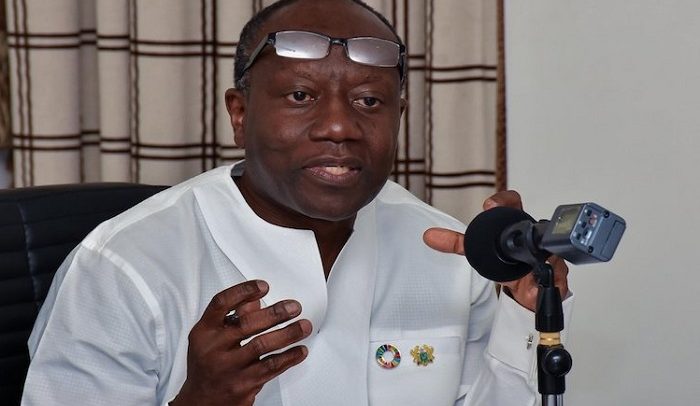Ken Ofori-Atta
THE INTERNATIONAL Monetary Fund (IMF) has approved a disbursement of US$1 billion for Ghana to be drawn under the Rapid Credit Facility to fight the coronavirus (COVID-19) disease.
The disbursement will help address the urgent fiscal and balance of payments needs that the country is facing, improve confidence, and catalyze support from other development partners, the organisation stated in a statement released at its website yesterday.
According to the Briton Woods Institution, the COVID-19 pandemic is already impacting Ghana severely, as it has started slowing down growth, tightening financial conditions, and putting the country’s exchange rate under pressure.
“The budget deficit is projected to widen this year given expected lower government revenues and higher spending needs related to the pandemic,” the statement indicated.
It added that “The uncertain dynamics of the pandemic creates significant risks to the macroeconomic outlook.
It stated further that an additional support for Ghana from other development partners would be required and critical to close the remaining external financing gap and ease budget constraints.
The IMF said even though Ghana continues to be classified at high risk of debt distress; the authorities remain committed to policies consistent with strong growth, rapid poverty reduction, and macroeconomic stability over the medium-term.
The IMF also praised government for timely and proactively responding to contain the spread of the COVID-19 pandemic in Ghana and support affected households and firms.
The statement acknowledged the interventions made by the Bank of Ghana, and added that the Central Bank had also recently taken steps to ensure adequate liquidity, preserve financial stability, and mitigate the economic impact of the pandemic, while allowing for exchange rate flexibility to preserve external buffers.
Background
Government had asked the IMF for liquidity support as it took various steps to safeguard the economy. among the measures, include an arrangement by the Ministry of Finance with the Bank of Ghana (BoG) to defer interest payments on non-marketable instruments estimated at GH?1,222.8 million to the year 2022 and beyond.
Finance Minister, Ken Ofori-Atta recently told Parliament that the government intended to adjust downwards expenditures on goods & services and capex (capital expenditure) by GH?1,248 million, while it secures the World Bank DPO of GH?1,716 million.
He hinted of the government’s move to secure GH?3,145 million from the International Monetary Fund (IMF) Rapid Credit Facility, besides reducing the proportion of Net Carried and Participating Interest due the Ghana National Petroleum Company (GNPC) from 30 percent to 15 percent.
He stated further that the government was also seeking to amend the PRMA to allow a withdrawal from the Ghana Heritage Fund to undertake emergency expenditures in periods of national emergency, saying: “There is an estimated US$591.1 million in the Ghana Heritage Fund.”
Mr. Ofori-Atta said the measures in the fiscal framework would result in a fiscal deficit of 6.6 percent of revised GDP, and added that the corresponding primary balance will be a deficit of 1.1 percent of rebased Gross Domestic Product (GDP).
“Mr. Speaker, it is clear that even after reflecting the proposed measures, the resulting fiscal deficit as a percentage of GDP is in excess of the 5 percent threshold stipulated by the Fiscal Responsibility Act, 2018 (Act 982),” he noted.
By Ernest Kofi Adu


